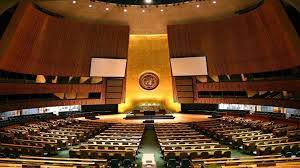F.P. Report
UNITED NATIONS: Pakistan has welcomed the conclusion of a legally binding instrument on the right to development, saying it addresses development challenges confronting the world.
In this regard, Ambassador Usman Jadoon, the acting permanent representative of Pakistan to the UN, commended the leadership role of former Pakistani Ambassador Zamir Akram in preparing the draft covenant on the right to development as a human right.
Ambassador Akram is currently the chair of the Geneva-based Human Rights Council’s Working Group on the Right to Development. The covenant was adopted on Thursday by the 47-member Council, which submitted the document to the U.N. General Assembly for adoption.
“The adoption by the General Assembly of a legally binding instrument would be a leap forward towards the realization of the right to development for those who have been left behind,” Ambassador Jadoon told the General Assembly’s Third Committee, which deals with social, humanitarian, and cultural issues.
Speaking in an interactive debate with Ambassador Akram, the chairman of the Working Group on the Right to Development, he noted that the covenant provides a blueprint for a world where everyone has the opportunity to reach their full potential.
Current global challenges — such as conflict, climate change, and recovery from the COVID-19 pandemic — visibly reveal that principles of global solidarity, responsibility and burden-sharing are eroding, Ambassador Jadoon said.
That, in turn, contributes to an unjust and unfair socio-economic and political world order, he pointed out. As such, Ambassador Jadoon said the right to development is not an abstract ideal but a fundamental human right.
Earlier, Ambassador Zamir Akram cited the instrument on the right to development as “the most important task” before the Working Group since 2019.
He updated the Committee on the work of the Working Group, which monitors and reviews progress made in the promotion and implementation of the right to development, analyses obstacles to its full enjoyment, and provides recommendations, bringing together member states, relevant UN agencies, and civil society representatives in removing the obstacles to inclusive and sustainable development.
Akram added that concluding the draft covenant is a huge step forward towards the eventual realization of the right to development. (APP)







